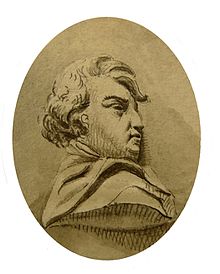Joan Gideon Loten
| Joan Gideon Loten | |
|---|---|
 |
|
| 29th Governor of Zeylan | |
|
In office 10 September 1752 – 17 March 1757 |
|
| Preceded by |
Jacob de Jong as acting governor |
| Succeeded by | Jan Schreuder |
| Personal details | |
| Born | 16 May 1710 |
| Died | February 25, 1789 (aged 78) |
Joan Gideon Loten (also spelt Johan or John) (16 May 1710 – 25 February 1789) was a Dutch servant in the colonies of the Dutch East India Company (VOC), the 29th Governor of Zeylan, Fellow of the Royal Society (elected 1760) and Fellow of the Society of Antiquaries of London (elected 1761). During his time in the colonies he made collections of natural history. In 1758 he moved to Holland. Nine months after his return from the Dutch East Indies he moved to London, where he lived for 22 years and interacted with scholarly societies and shared his natural history illustrations and collections.
Joan Gideon Loten, born in Groenekan, near Utrecht he was the eldest son of secretary of the waterboard Joan Carel Loten (1669 - 1769) and Arnoldina Maria van Aerssen van Juchen (1685 - 1775). The Loten family originally came from the Southern Netherlands. Circa 1720 Loten lived with his parents and younger brother Arnout (1719-1801) in Utrecht. In 1726 he was a student of the Utrecht University. One of his teachers was Pieter van Musschenbroek. In March 1728 he left University and became a clerk of the Amsterdam Chamber of the Dutch East India Company. By means of patronage of members of his family Loten was appointed junior merchant of the Company in 1731.
In January 1732 he left the Dutch Republic with the East India man Beekvliet and headed to Batavia (Jakarta). On 25 August 1733 he married Anna Henriette van Beaumont (1716-1755), a member of a prominent family in Batavia (for example, her uncle Isaak Augustijn Rumpf had been Governor of Dutch Ceylon from 1716 to 1723). Eleven years later he was elected Governor of Makassar (Ujung Pandang) (1744-1750) and in 1752 he became himself Governor of Ceylon (1752-1757). In 1749 he was elected Councillor of the Dutch East Indies and thus obtained a seat in the government of the Dutch East India Company at Batavia. He was a capable administrator. He was usually respectful of the native population and did not exercise immoderate forms of supremacy. There is nothing to indicate that he pursued personal wealth by means considered improper or ruthless by his contemporaries. Although he was successful in the Dutch East Indies, in later years he became embittered against the Company and the way the Court of directors in Amsterdam and the Government at Batavia treated its former servants.
...
Wikipedia
